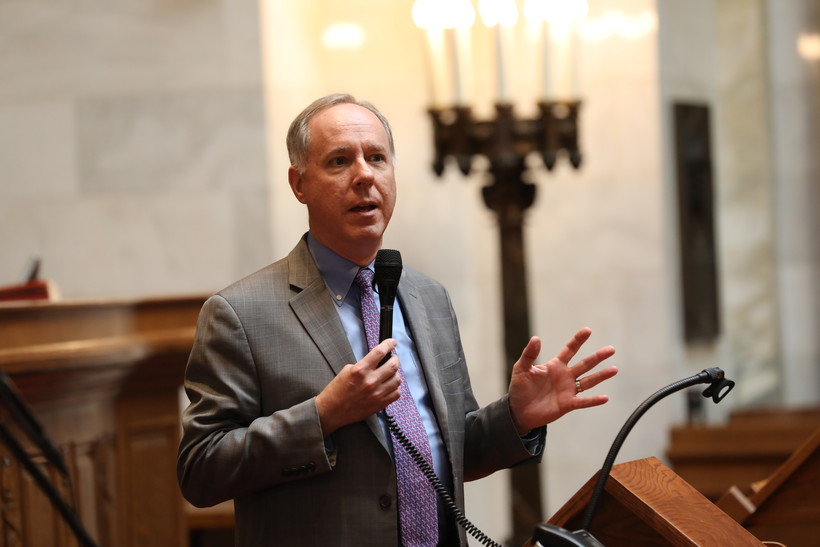Vos Wants More Than $3.4 Billion in Tax Cuts
With most of it to higher income taxpayers. Legislative leaders offer contrasting views.
Assembly Speaker Robin Vos (R-Rochester) and Rep. Kalan Haywood (D-Milwaukee) spoke about their priorities for the state’s projected $6 billion budget surplus at an online panel hosted by the Wisconsin Policy Forum Friday. The discussion follows the nonpartisan research organization’s report showing that Wisconsin is in a better position this year to make new commitments and take on the increasing costs of ongoing state and local services.
Vos laid out his vision for statewide tax cuts he wants included in the next budget, while remaining noncommittal on increased education and municipal spending.
Vos said he is looking for tax cuts to exceed the total included in the last budget, which totaled about $3.4 billion. He said the previous amount is the “absolute bare bones bottom” for what the budget should include and that a new round of cuts should be larger.
“I can’t see us doing a lower tax cut than we did last time considering we have historic revenues,” Vos said. “I would think it would be significantly higher than that but those are discussions our caucus is still having.”
Republican leaders are aiming to use the opportunity to pursue tax reform in Wisconsin and work to flatten the state’s graduated tax system. Vos said Friday that all taxpayers deserved relief, but that the vast majority of the money is likely to go into the upper brackets because people who earn the most money pay the most in taxes.
Under the current system, Wisconsin residents pay anywhere from 3.54% to 7.65% in individual income taxes.
Senate Majority Leader Devin LeMahieu has also previously said he supports an overhaul of Wisconsin’s system from the current graduated system to a flat tax, so people in every tax bracket would pay the same rate.
The leaders also discussed potential state investments.
“There’s an opportunity to invest in the people of Wisconsin whether that’s education, health care, transportation, but really invested in things people need.” Haywood said. “It’s the people’s money, so make sure to invest that money and those dollars into the people.”
With schools facing a potential funding cliff as federal COVID relief money dries up, Vos said he would be open to considering increasing school funding, which remained flat in the last budget. He said it’s possible school districts would need additional help to fill gaps that could be left by the end of pandemic relief funds.
During the last budget, the Republican-led Legislature attempted not to increase education spending at all, due to the influx of federal COVID funds that schools would be receiving. After being notified they could lose the federal aid, the Legislature included a general education $706 million increase in spending but didn’t raise spending caps, meaning the money could only go towards property tax relief rather than school spending.
“It probably makes sense for the state of Wisconsin to have some kind of makeup aid for legitimate expenses that happen over the course of the past two years with that one time federal funding,” Vos said. “If wage increases were given, we’re certainly not going to go down and then start going back up… so that’s one thing that I’d be open to taking a look at.”
The leaders also spoke about potential changes to Wisconsin’s shared revenue system, which is how local governments receive money from the state. Vos discussed a proposal that would replace the revenue system with 1% of the state sales tax, with the idea that as revenue from the tax grows it could be shared with local governments.
Vos was against the idea of increasing Milwaukee’s revenue — including through an increase in the city’s sales tax rate to 1% — unless the city looked at reforming its current financial operations through methods including cutting services.
Haywood said if any changes are made to the shared revenue formula that he hopes the formula will give Milwaukee a larger share of the funds.
“I hope that changing the formula would mean that we get more of our fair share. Milwaukee is a huge, huge contributor to the shared revenue system around the state, so hopefully, there is that reform that happens,” Haywood said. “We talk about Milwaukee making reforms in how we operate the city or the county. I hope there’s also reforms in how we operate the shared revenue [system], allowing Milwaukee to get its fair share.”
Assembly leaders discuss visions for budget surplus was originally published by the Wisconsin Examiner.























Wow! What a refreshing new idea to give tax cuts to the rich.
Republicans are lazy fat leaches on this state.
What is $3,400,000,000? It is three thousand, four hundred million. I suggest taking $200 million, giving it to the DOR, and requiring that the money be used to audit the rich. Anyone with an income over $400,000/year. Let them go to town. They will find billions in unpaid taxes.
Vos’ idea? Sheer stupidity.